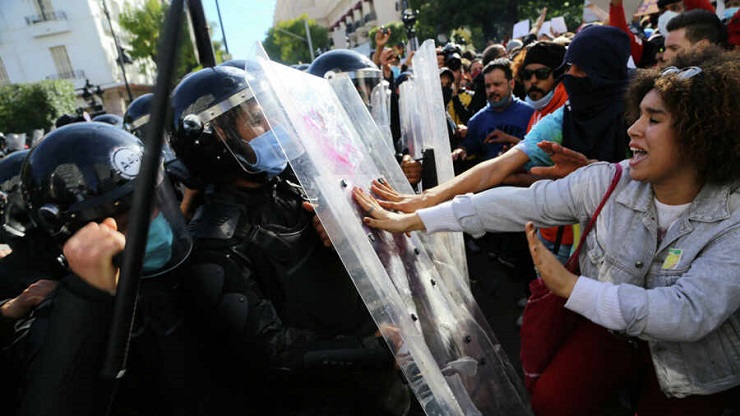Ten years after the outbreak of the Arab Spring in the Middle East, Tunisia, its cradle, has once again plunged into a wave of protest, the cause of which was the same problems unresolved by the “revolutionaries”: primarily in the socio-economic field, the fight against unemployment, mainly affecting young people, the dominance of corruption.
On July 25, their national holiday, Republic Day, thousands of citizens of this North African nation took to the streets of the capital and other major cities to demand the dissolution of Parliament and early elections. The protesters demanded a change in the political regime and those responsible for the worsening of the country’s epidemiological and socio-economic condition be brought to justice.
One of the protesters’ main demands was against the ruling Ennahda Movement (also known as the Renaissance Party) policies, which has been in power since 2011. The action began in the suburbs of the capital, in Le Bardo, where protesters surrounded the building of the Assembly of the Representatives of the People of Tunisia (APR, unicameral Parliament). They tried to break into the parliament building and threw bottles and stones at the law enforcement officers, which led to clashes between the demonstrators and the gendarmerie. In several other cities of Tunisia, in particular, Kairouan, Sousse, Monastir, Sfax, El Kef, the protesters also attacked the headquarters of the Ennahda Movement, whose leader Rachid al-Ghannouchi is the chairman of the Assembly of the Representatives of the People (ARP, unicameral Parliament). In Tozeur province, citizens burned down Ennahda’s headquarters and destroyed all its property.
According to Tunisian radio station Mosaique FM, Tunisians blame the Ennahda Movement for the deteriorating situation in the country. The party was founded on June 6, 1981, as an Islamic movement and operated illegally for several decades. The official authorization for political activity was received on March 3, 2011, after Tunisian President Zine El Abidine Ben Ali resigned and fled to Saudi Arabia due to the Second Jasmine Revolution.
The protests are increasing pressure on the country’s fragile government, which is engaged in a political struggle with President Kais Saied as he tries to avert an impending financial crisis amid a week-long spike in the COVID-19 pandemic and rising death rates.
Recently, the Tunisian health system has been under unprecedented strain because of the coronavirus. According to Health Ministry spokeswoman Nassaf ben Alaya, the health care system has collapsed. Tunisia is being helped by several countries, including Egypt, Kuwait, and Qatar, which have provided humanitarian aid and medical oxygen. On July 8, Libya closed its border with Tunisia as part of the fight against the spread of the coronavirus, and Health Minister Faouzi Mehdi was sacked on July 20.
Under these conditions, Tunisian President Kais Saied dismissed Prime Minister Hisham al-Mashishi, froze the work of Parliament, and stripped all deputies of their immunity amid anti-government protests that swept the country. He also banned Parliament Speaker Rachid al-Ghannouchi and 64 deputies from leaving the country. According to Tunisian media reports, the ban applies primarily to those parliamentarians against whom legal proceedings are pending. In a statement issued, Tunisian President Kais Saied said he was striving to protect the people’s interests and warned his opponents that the army would answer attempts to undermine order. Saied’s supporters greeted the statement with enthusiastic demonstrations.
In response, Rachid al-Ghannouchi, who is also the leader of the Islamist Ennahda Movement, made a video message calling on Tunisians to “defend the gains of the revolution” and organize demonstrations. Parliament Speaker Rachid al-Ghannouchi accused the president of committing a coup d’état against the revolution and the constitution. However, many Tunisians believe that only a strong hand can overcome the political and economic crisis exacerbated by the pandemic.
To avoid chaos and bandit pogroms in the country, the head of the presidential guard, Khaled Yahyaoui, was appointed interim head of the interior ministry. He temporarily took over executive power until a new prime minister of the country is appointed. Khaled Yahyaoui stressed that he would act within the law and respond to the people’s demands. Later, the presidential office specified that the work of the Parliament was frozen for 30 days.
On Sunday night, July 25, the government forces entered the capital of Tunis. Troops took up positions in the center of the city, particularly near the building of the Assembly of the Representatives of the People and the headquarters of the national television company.
Observers report that the protests are only gaining momentum. The public is angered by disagreements between political parties in the legislature and the confrontation between Parliament Speaker Rachid al-Ghannouchi and President Kais Saied. Demonstrators demand a change in the constitution and the introduction of a transition period. Power could pass to the army at this stage, while Saied would retain his position as head of state.
Vladimir Danilov, political observer, exclusively for the online magazine “New Eastern Outlook”.

